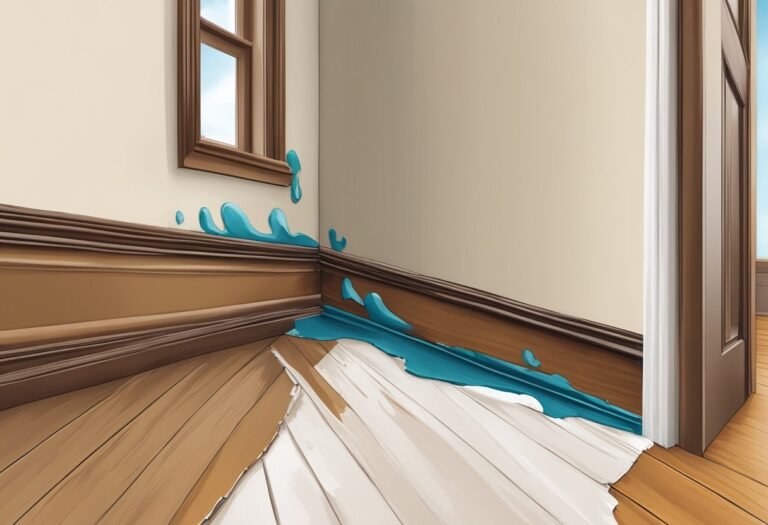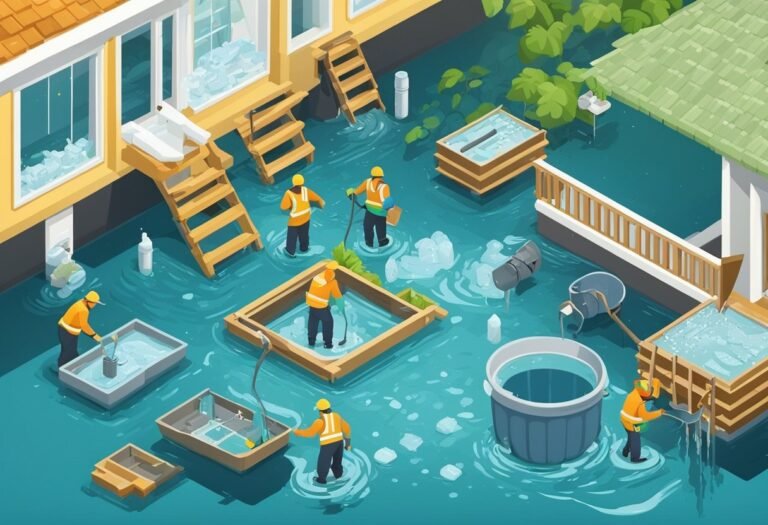Dealing with Insurance Adjuster After Water Damage
Water damage can turn your home into a soggy mess. Dealing with insurance adjusters after such an event can be tricky. Many homeowners feel stressed when faced with this task.

The key to success is good communication and thorough documentation of the damage. Take lots of photos and videos before cleanup starts. Keep all receipts for repairs and temporary housing. This evidence will help support your claim.
Insurance adjusters are there to assess the damage and determine coverage. Be polite but firm when talking to them. Ask questions about your policy and what it covers. Don’t be afraid to get a second opinion if you disagree with their assessment. Remember, you can hire a public adjuster to work on your behalf if needed.
Understanding Your Insurance Policy Before Filing a Claim

Knowing what your insurance policy covers is key before you file a claim for water damage. This helps you avoid surprises and get the most from your insurance.
Insurance Coverage Essentials
Most home insurance policies cover sudden water damage from things like burst pipes or leaky roofs. But they often don’t cover floods or slow leaks that happen over time. It’s smart to check if you need extra flood insurance, especially if you live in a flood-prone area.
Look at your policy’s coverage limits. This is the most your insurance will pay for damages. Make sure it’s enough to fix major water damage. Your policy also has a deductible – the amount you pay before insurance kicks in.
Check for exclusions too. These are things your policy won’t cover, like mold damage or sewer backups. You might be able to add coverage for these if you want.
The Role of Insurance Adjusters
Insurance adjusters check out the damage and decide how much the insurance company should pay. They work for the insurance company, not you. Their job is to settle claims fairly, but also to save the company money.
When you file a claim, an adjuster will visit your home. They’ll look at the damage, take photos, and ask questions. It’s a good idea to have your own photos and lists of damaged items ready.
You can also hire a public adjuster. They work for you, not the insurance company. They can help you understand your policy and might get you a better payout. But they charge a fee, usually a percentage of your claim.
Navigating the Claims and Restorations Journey
Dealing with water damage can be tough. The claims process has many steps, from reporting the incident to getting repairs done. Here’s what you need to know to handle it smoothly.
Initiating the Claims Process
When water damage hits, act fast. Call the insurance company right away. They’ll ask for details about what happened. Take lots of pictures and videos of the damage. This helps prove your case later.
Keep a record of all talks with the insurance folks. Write down who you spoke to and when. Save any emails or letters too.
The insurance company will send someone to check out the damage. This person is called an adjuster. They’ll look at everything and decide how much money you should get.
Mitigating Damage and Obtaining Estimates
Don’t wait for the insurance company to start cleaning up. You need to stop more damage from happening. This might mean:
- Removing standing water
- Drying out wet areas
- Covering holes in the roof
Keep all receipts for things you buy or services you use. The insurance might pay you back for these costs.
Get at least three estimates for repairs. Make sure they’re from licensed pros. These estimates help you know if the insurance offer is fair.
Watch out for hidden problems like mold. It can grow fast after water damage. Make sure the estimates cover checking for and fixing these issues too.
Achieving a Fair Settlement
Review your policy carefully. Know what it covers and what it doesn’t. Some policies might not cover flood damage or sewer backups.
Don’t rush to accept the first offer. Compare it to your repair estimates. If it’s too low, speak up. You can negotiate with the insurance company.
If you’re not happy with the offer, ask the adjuster to explain why. Sometimes they miss things. Point out anything they overlooked.
Keep pushing for a fair deal. If you’re still not satisfied, you might need to:
- Ask for a different adjuster
- File a complaint with your state’s insurance department
- Get help from a public adjuster or lawyer
Frequently Asked Questions
Dealing with insurance adjusters after water damage can be tricky. These common questions cover key points to keep in mind when filing a claim.
What should I tell my insurance adjuster about the water damage in my home?
Be honest and thorough when describing the damage. Take lots of photos and videos. Make a detailed list of damaged items. Tell the adjuster when the damage happened and what caused it.
Keep records of all conversations. Ask for the adjuster’s contact info. Don’t be afraid to ask questions if you’re unsure about something.
Can you give tips on maximizing my insurance claim for water damage?
Document everything carefully. Take photos before cleanup starts. Save receipts for any repairs or replacements. Get multiple repair estimates from licensed contractors.
Don’t throw away damaged items until the adjuster sees them. Read your policy closely to understand your coverage. Consider hiring a public adjuster for big claims.
What are some reasons an insurance claim for water damage might be denied?
Lack of proper home maintenance can lead to claim denials. Gradual damage that happens over time often isn’t covered. Some policies don’t cover flood damage or sewer backups.
Not reporting the damage quickly enough can be a problem. The insurer might say the damage isn’t as bad as claimed. Sometimes there’s disagreement about what caused the damage.
How does the location, like Florida or California, affect dealing with insurance adjusters for water damage?
Areas prone to hurricanes or floods may have stricter rules. Insurance costs are often higher in these places. Some insurers won’t cover certain types of water damage in high-risk zones.
Local laws can affect how claims are handled. The claims process might be slower after a major disaster. It’s smart to know your area’s specific risks and coverage options.
Are there specific tactics insurance adjusters use that I should be aware of when filing a water damage claim?
Some adjusters might downplay the extent of damage. They could push for quick settlements. Watch out for low initial offers. Be wary if they suggest using specific contractors.
Don’t sign anything without reading it carefully. Ask for explanations of any confusing terms. Remember, you can get a second opinion if you disagree with their assessment.
How do insurance companies determine the payout amount for a water damage claim?
They look at the damage extent and repair costs. The type of coverage you have matters. They consider the value of damaged items. Some policies have limits for certain types of damage.
Adjusters might use software to estimate costs. They often factor in local prices for materials and labor. Your deductible will be subtracted from the final payout amount.

